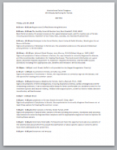
Agenda
Friday, June 27, 2014
8:00 am – 8:30 am Registration/Coffee/Networking/Welcome
8:30 am – 9:30 am The Healthy Ferret & Routine Care; Renè Gandolfi, DVM, ABVP (Canine & Feline)
Basic ferret anatomy, the proper procedure for a good physical exam, and the routine care of ferrets including vaccinations, treatment of ear mites, fleas, coccidia, and heartworm prevention.
9:30 am – 10:30 am Distemper in the Ferret Shelter; Kevin Farlee and Debbi Walcker, Washington Ferret Rescue & Shelter
Signs and symptoms of distemper in ferrets and the anecdotal evidence on the spread of distemper among ferrets in a ferret shelter.
10:30 am – 12:00 pm Adrenal Gland Disease; Jerry Murray, DVM
Signs and symptoms of adrenal disease in ferrets, the requirements to correctly diagnose the disease, and the recommended medications for treating the disease. The most recent information on Lupron depot, Deslorelin implants (Suprelorin F), melatonin implants (Ferretonin), and the GnRH vaccine (GonaCon) including their appropriate uses, benefits and limitations will be discussed.
12:00pm – 1:00 pm Lunch Break; Buffet lunch provided onsite (Vegan & vegetarian friendly)
1:00 pm – 2:00 pm Insulinoma in Ferrets; Jerry Murray, DVM
Signs and symptoms of insulinoma in ferrets, the requirements to correctly diagnose the disease, and the options for treating this common cancer.
2:00 pm – 3:00 pm Emergency Medicine for Ferrets; Katrina Ramsell, Ph.D., DVM
Signs and symptoms of ferret emergencies, including respiratory distress, cardiac emergencies and life-threatening conditions; how to stabilize and/or keep the ferret comfortable and establish a time line for treatment options and decision making. Medical and surgical options, as well as how to make a decision to euthanize, will be discussed.
3:00 pm – 3:30 pm Break
3:30 pm – 4:30 pm Lymphoma in Ferrets; Natalie Antinoff, DVM, ABVP (Avian)
Signs and symptoms of lymphoma in ferrets, the requirements to correctly diagnose the disease and at least three options for treating this common cancer.
4:30 pm – 5:30 pm Other Cancers in Ferrets; Karen Purcell, DVM
Signs and symptoms of several other cancers in ferrets including skin cancers, chordomas and sarcomas; requirements to correctly diagnose these neoplasia and the appropriate surgical and medical options for treating these cancers.
5:30 pm – 6:15 pm Veterinary Panel Q&A;
Participants will have the opportunity to ask any questions of the veterinarians about which they would like clarification or about specific cases or concerns and to have them addressed by the presenters.
6:15 pm – 6:30 pm Door prizes and wrap-up
Saturday, June 28, 2014
8:00 am – 8:30 am Registration/Coffee/Networking/Welcome
8:30 am – 9:30 am Cardiology; Robert Wagner, DVM, ABVP (Exotic Companion Mammal)
Signs and symptoms of heart disease in ferrets and how to differentiate between the types of cardiomyopathy; the use of common clinical tests to diagnose the ferret. The use, benefits and limitations of telemedicine in cardiology will be discussed. Treatment options will be also be presented.
9:30 am – 10:30 am Ultrasound & Radiology in Ferrets; Natalie Antinoff, DVM, ABVP (Avian)
The different ways in which ultrasound and radiology can be used to assist the veterinarian in the diagnosis and treatment of various illnesses and/or injuries in ferrets. The similarities and differences of ferrets to cats and dogs will be discussed.
10:30 am – 10:45 am Break
10:45 am – 11:45 am Common Obstructions in Ferrets: Urinary Tract Obstructions and Intestinal Obstructions; Natalie Antinoff, DVM, ABVP (Avian) & Karen Purcell, DVM
Signs and symptoms of common intestinal and urinary tract obstructions in ferrets. The proper technique for urinary catheterizing of ferrets and the procedures and techniques involved in the surgical treatment of urinary and intestinal obstructions are covered.
11:45 am – 12:45 pm Surgery in Ferrets; Karen Purcell, DVM
Anesthesia and pain management options for ferret surgeries; the indications for amputation/removal of the tail, leg, eye, spleen, skin tumors and spay/neuter of ferrets. Orthopedics and biopsies and indicators for specific surgeries will be discussed. Complications of the surgeries will also be covered.
12:45 pm – 1:45 pm Lunch
1:45 pm – 2:45 pm Emerging Ferret Diseases; Katrina Ramsell, Ph.D., DVM
Recent information about three emerging ferret diseases, the signs and symptoms of each, diagnosing and differentiating them from other diseases, and the treatment options available.
2:45 pm – 3:45 pm Caring for the Sick Ferret: Palliative and Supportive Care at Home; Barb Carlson, Hide-E-Hole Ferret Rescue & Shelter
The proper procedure for expressing a ferret bladder, administering subcutaneous fluids, and safely administering medications both orally and intramuscularly; the veterinarians will learn how to assess the ability and limitations of the ferret owner to provide palliative and supportive care at home and learn the most effective and simple techniques for educating the ferret owner in these procedures.
3:45 pm – 4:30 pm Veterinary Panel Q&A;
Participants will have the opportunity to ask any questions of the veterinarians about which they would like clarification or about specific cases or concerns and to have them addressed by the presenters.
4:30 pm – 5:00 pm
Wrap-up paperwork and hand out CE Certificates.
This program has been approved for 13.0 hours of continuing education credit in jurisdictions which recognize AAVSB RACE approval; however participants should be aware that some boards have limitations on the number of hours accepted in certain categories and/or restrictions on certain methods of delivery of continuing education. Call Renee Downs +1.907.644.5655 for further information.
What was written about past symposiums:
Portland by Marylou Zarbock
Phoenix by Marylou Zarbock
Pittsburgh by Bob Church